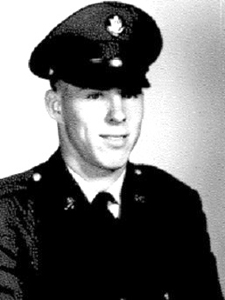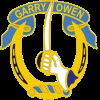Charley
Robert Merriman
Somebody said the superintendent's house was on fire, so the five of us walked down the hill from school to watch it burn.
Four of us were seniors that spring of 1964 - Larry, James, Jimmy and me. Charley was the fifth member of our group. He was a junior, and we let him run around with us as long as he didn't do anything stupid.
The day was chilly. Larry, James, Jimmy and I had on coats; Charley wore a short-sleeved shirt. If Charley owned a coat, it was a secret kept from everybody who knew him. Charley's father was a pulp wood cutter. None of us had ever seen him, except when he drove his loaded log truck to the railroad where the cars that carried pulp were parked. Charley's family lived back in the woods, the deep woods, down a dirt road somewhere. His family didn't have much. None of us did, but Charley's family had even less than the rest of us.
Charley was a bright kid, quick and intelligent. Everybody has known a kid like Charley, known that somewhere behind those quick remarks and comic attitude lay an ability to do more than he did. Charley could have made excellent grades, but he chose not to. Teachers wouldn't have known what to do with him if he had. Besides, in Charley's life there was reality, then everything else. And the reality was that Charley was the son of a pulp wood cutter. Barring some great miracle, Charley would always be the son of a pulp wood cutter.
The superintendent's house was really burning by the time we got to the bottom of the hill. The fire had burned through the roof . The five of us just stood around for a minute or so, watching the house burn. Then Charley said, "I bet we can save some of their stuff", and before we could stop him, Charley opened a window and crawled inside the burning house. We four seniors stood outside the window, taking whatever Charley handed out. Pretty soon we had a pile of chairs, small tables and books stacked beside a pecan tree.
Charley had just started on a closet when the fireman arrived. The school was between two towns, each four miles away, and it took the volunteer fireman a little while to get there. Charley was handing out a pile of clothes when one of the firemen ran up to us yelling. "What do you boys think you're doing? You're giving the fire more oxygen! Shut that window!" Grownups knew more than us kids, so we got Charley out of the house, shut the window and watched the fireman spray water on the house.
After the fire was out, we went inside the house. Everything was burned; nothing usable was left. We went back outside.
The basketball coach came up and said, "I hear you boys saved a lot of stuff from the house." One of us said, "Yes sir, but it was Charley's idea. He went inside. All we did was take what he handed out the window."
The coach turned to Charley, who stood there with his hands in his pockets. The day had turned colder. The coach said, "You look cold. Where's your coat?" Charley replied, "I don't have it with me." The coach just nodded. He said, "You did a good job. I think you've done enough for today. Why don't I drive you home." Charley said, "It's only one o'clock." The coach laughed. "I know. But I don't think the superintendent will mind."
We four seniors graduated that year. Larry went to work for a telephone company. In September, James and Jimmy went off to college. I joined the Army.
In August of 1967 I met up with Larry at Bear Cat, base camp of the 9th Infantry Division. Larry had been drafted in 1966. We sat around in his hooch for a while, drank beer, talked about people back home.
After I got back home, I learned that James had graduated from college and had a job with NASA in Houston. I ran into Jimmy at a high school football game in 1969. He had put on a few pounds, didn't look like the all-district tackle from high school. Jimmy was married, had a kid, taught at a junior high. He said we were doing the right thing in Vietnam. We had to stop those Communists somewhere. But: "I've got a wife and kid, Bob. I can't become involved in a war thousands of miles from home."
That takes care of everybody but Charley.
See, the thing is, Charley didn't have to go in that burning house. He could have been just like the rest of us, stayed outside and watched it burn. But Charley wasn't like that. Peoples' things would be lost if somebody didn't do something. And although Charley had absolutely nothing in common with the superintendent, he went inside the burning house. Charley knew what had to be done, what he had to do.
In 1965, Charley enlisted in the Army, went to Vietnam and died there.
In April 1988, I was in Dallas on Army business. I went to Fair Park. There's a monument there, lists the names of Texans who died in Vietnam. There were a few names I wanted to see; one in particular. I found him.





